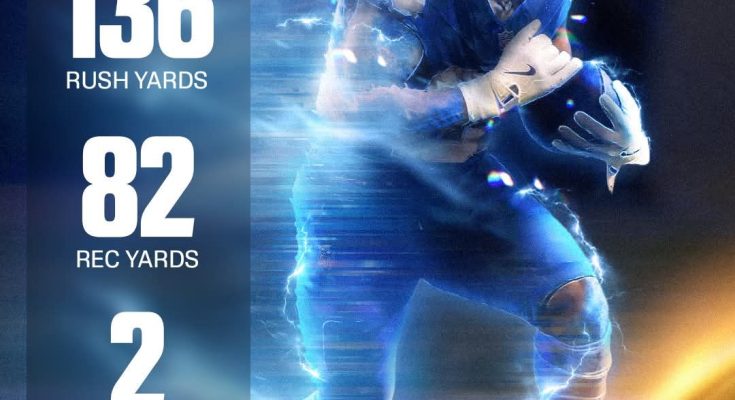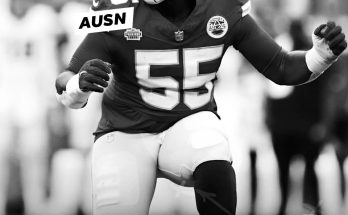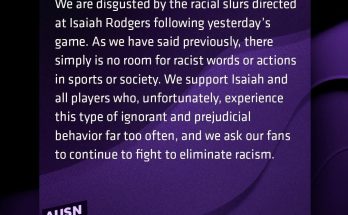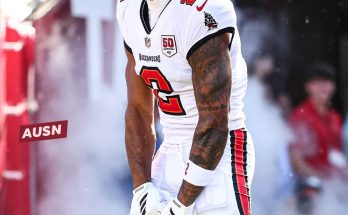Detroit is roaring again, and at the center of the storm is a player whose nickname perfectly fits his speed, explosiveness, and energy — Jahmyr “Sonic” Gibbs. On Sunday afternoon, Ford Field turned into a highlight reel for the young running back, who delivered a career-defining performance in the Lions’ emphatic victory over the Tampa Bay Buccaneers. Gibbs’ 218 total yards weren’t just numbers on a stat sheet — they were a statement, a declaration that Detroit’s offense has a new superstar in motion. As the Lions improved to 5-2, the energy in the building made it clear: the Motor City is running on Sonic power.
From the opening snap, it was evident that Detroit had a plan centered around unleashing Gibbs. The Buccaneers, known for their stout defensive front led by Vita Vea and Lavonte David, tried early on to close running lanes and limit big plays. But Gibbs was relentless, blending lightning-quick cuts with vision well beyond his years. His acceleration through the smallest gaps made the Tampa Bay defense look a step too slow all afternoon. Every time he touched the ball, there was a collective buzz from the stands — fans sensed that something special could happen. And more often than not, it did.
By the end of the first quarter, Gibbs had already racked up 76 total yards, including a 32-yard burst that left defenders grasping at air. Offensive coordinator Ben Johnson clearly wanted to test the edges of the Buccaneers’ defense, and Gibbs was more than happy to oblige. His ability to reach top speed within two steps turned short gains into chain-moving plays. Quarterback Jared Goff, who managed the offense with his usual poise, seemed to trust Gibbs completely — a big step for a young back who’s still carving out his identity in the league.
In the second quarter, the Lions offense really began to hum. Goff spread the field, connecting with Amon-Ra St. Brown and Sam LaPorta to stretch Tampa’s coverage, and Gibbs capitalized on the open spaces. On one particularly electric play, he caught a swing pass near the left sideline, juked one defender, slipped another, and sprinted for 45 yards before being dragged down at the 12-yard line. The crowd exploded, chanting his nickname as if Ford Field had transformed into a college stadium. Moments later, Gibbs finished what he started, powering through for a 6-yard touchdown run — a play that showcased both his balance and determination.
At halftime, the Lions led 17-10, and Gibbs had already crossed the 120-yard mark. Reporters and fans alike began drawing comparisons to Detroit’s legendary running backs, from Barry Sanders’ fluid movement to Jahvid Best’s breakaway speed. The Buccaneers looked visibly frustrated, as every defensive adjustment they tried seemed one step behind. Detroit’s offensive line, anchored by Frank Ragnow and Penei Sewell, deserves plenty of credit too. Their ability to open lanes and protect Goff allowed Gibbs to work his magic without constantly facing pressure in the backfield.
The third quarter turned into a showcase of Gibbs’ versatility. Not only did he continue to dominate on the ground, but he also became a crucial weapon in the passing game. Goff repeatedly found him on checkdowns and screens, exploiting Tampa’s over-aggressive linebackers. One of the defining plays of the game came midway through the quarter when Gibbs took a short pass, spun off a tackle, and blazed down the right sideline for a 58-yard gain. The sequence encapsulated everything that makes him unique: the vision, the acceleration, and the ability to turn a simple play into a highlight.
After that play, it was clear the Buccaneers were running out of answers. Their front seven, which had been one of the best in the NFC so far this season, looked gassed and uncertain. Every time Gibbs lined up in motion, defenders pointed, shuffled, and hesitated — a sure sign that the rookie had gotten into their heads. The Lions fed off that energy. The offense played fast, confident, and efficient, maintaining drives and wearing down Tampa Bay’s defense with every possession.
In the fourth quarter, with Detroit nursing a 24-17 lead, Gibbs put the finishing touch on his masterpiece. On a second-and-eight from their own 27-yard line, he took a handoff, waited for the block to develop, and then exploded through a narrow crease. One cut later, he was gone — 73 yards untouched to the end zone. The crowd erupted, waving towels and roaring as “Sonic” sprinted past the goal line. His teammates mobbed him on the sideline, and even head coach Dan Campbell couldn’t help but smile. It was the kind of play that changes how a player is perceived — not just as a contributor, but as a cornerstone.
That touchdown effectively sealed the game, pushing Detroit ahead 31-17. The defense, led by Aidan Hutchinson and Brian Branch, handled the rest, closing out the Buccaneers with aggressive pass rush and timely coverage. When the clock hit zero, Ford Field echoed with chants of “Let’s go Lions!” and “Gibbs! Gibbs! Gibbs!” The scoreboard told one story, but the emotion in the stadium told another — this wasn’t just a win, it was a glimpse into the Lions’ future.
Statistically, Gibbs finished the game with 146 rushing yards on 19 carries, 72 receiving yards on 6 catches, and two total touchdowns. But those numbers only tell part of the story. What stood out most was the confidence and control he displayed throughout the game. For a player whose early NFL months were marked by questions about workload and role behind David Montgomery, this performance erased any doubt. He looked like a player ready to lead, ready to shoulder the responsibility of being Detroit’s offensive spark.
Dan Campbell praised him afterward, saying, “That’s what we’ve been waiting for. He’s got that burst, that energy — and today he showed the world what he can do when he’s let loose.” Goff echoed that sentiment, calling Gibbs “the heartbeat of the offense today.” Even veterans like Taylor Decker and St. Brown couldn’t hide their excitement, talking about how Gibbs’ energy on the sideline kept the team motivated.
What this win means for the Lions extends beyond the standings. At 5-2, they’ve positioned themselves as serious contenders in the NFC. Their mix of physicality, creativity, and balance on offense is something few teams can match. Gibbs’ emergence adds a layer of unpredictability — he can line up in the slot, take screens, run between the tackles, or bounce outside for explosive plays. With Montgomery expected to return soon, Detroit could soon field one of the league’s most dangerous backfield duos.
For Tampa Bay, the loss was a harsh reminder of the gap between potential and execution. Quarterback Baker Mayfield had flashes of brilliance, connecting with Mike Evans and Chris Godwin for big gains, but inconsistency and turnovers doomed their efforts. The Buccaneers’ defense, which had been dominant for much of the season, simply couldn’t contain Detroit’s speed and rhythm. Head coach Todd Bowles admitted postgame, “We missed too many tackles, we were out of position, and they made us pay.”
Meanwhile, Detroit’s fan base can finally start to believe that this team is more than a feel-good story. Under Campbell’s leadership, they’ve developed an identity built on toughness, accountability, and explosive playmaking. And with Gibbs stepping into the spotlight, they now have a player capable of breaking a game open at any moment. His combination of acceleration and vision recalls some of the greats who’ve donned the Lions uniform, but his style feels distinctly modern — a blend of finesse and raw speed that keeps defenses guessing.
As the Lions look ahead, the road doesn’t get easier — matchups against the Packers, Vikings, and Cowboys loom large. But with momentum building and confidence surging, there’s a sense that Detroit is ready for anything. The connection between the players, coaches, and fans feels genuine, and that unity is translating into results on the field.
For Gibbs personally, this game could be the turning point of his young career. Every superstar has that one performance that defines their arrival, and Sunday may have been his. The nickname “Sonic” isn’t just clever branding anymore — it’s a symbol of how he plays the game: fast, fearless, and full of heart. Detroit has been waiting for a player like this for a long time, someone who can electrify the stadium and shift momentum in a heartbeat.
As fans filed out of Ford Field, many lingered, savoring the moment. Kids wore Gibbs jerseys, older fans swapped memories of Barry Sanders, and the city felt alive with pride. The Motor City loves its underdogs, and in Jahmyr Gibbs, they see not just talent but a reflection of Detroit itself — resilient, relentless, and fast as lightning.
The Lions are 5-2, their best start in years, and the future has never looked brighter. If Sunday was any indication, the league better be ready — because Sonic and the Lions are just getting started.



